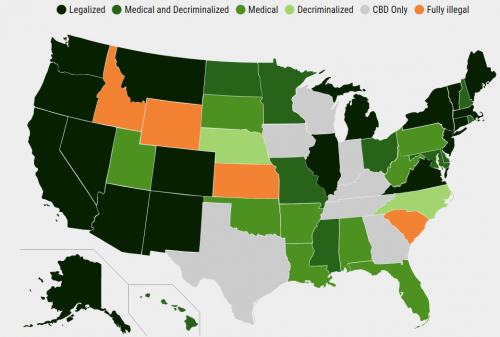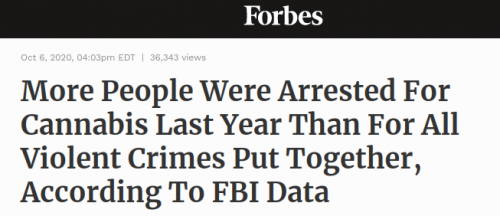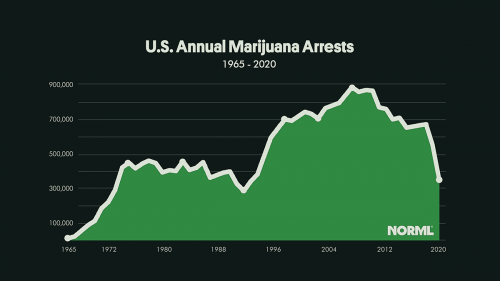Legalization in 2022

For decades legalization advocates told anyone who would listen that if you really wanted to take the crime and violence out of drugs, legalization would be the way to go. Social conservatives scoffed at the idea.
Congressional researchers have now admitted the obvious.
Demand for marijuana illegally trafficked from Mexico will continue to decline as the legalization movement spreads, a new report from Congress’s research arm states.With a growing number of U.S. states—as well as Canada—allowing people to legally purchase cannabis in a regulated market, they’re less inclined to seek out the product through illicit channels, the Congressional Research Service (CRS) said.
The evidence is everywhere, and on every level.
“Based on Border Patrol seizures, smuggling has fallen 78 percent over just a five-year period,” the think tank found. “Because marijuana was the primary drug smuggled between ports of entry, where Border Patrol surveils, the value of the agency’s seizures overall—on a per-agent basis—has declined 70 percent.” An end-of-the-year report from Supreme Court Chief Justice John Roberts in 2019 seems to substantiate the idea that legalization is having an impact on marijuana trafficking, noting that while federal prosecutions of drug-related crimes increased in 2019, cases involving cannabis dropped by more than a quarter. A separate U.S. Sentencing Commission report showed that, for the 2017 fiscal year, federal drug cases overall were on the decline, driven by a sharp drop in marijuana prosecutions."
And yet despite all of this evidence, this is still the reality.

The data from the FBI’s report revealed that police arrested 545,602 people for cannabis related crimes in 2019. That arrest rate is 9% higher than the 495,871 people arrested for violent crimes the same year. And those being arrested for cannabis aren’t just those making money from selling, growing or manufacturing the drug - they are mostly just people who use cannabis. The vast majority of these arrests (92%) were for simple possession of the drug. 500,395 of those arrested for cannabis were simply found in possession of cannabis. Even if we take out all the arrests for being involved in unregulated cannabis commerce and just focus on arrests for cannabis possession, the numbers still outpace arrests for violent crimes.
“Police across America make a marijuana-related arrest every 58 seconds,” explains Erik Altieri, the Executive Director for cannabis advocacy group NORML.
That's ridiculous, but let's put this into context. Arrests for marijuana have fallen by more than half.

More states will be legalizing this year.
On Jan. 26, 2022, the House Health and Human Development committee approved HB 305, a bill that would make cannabis legal for adults 21 and older, replacing prohibition with a system of regulation that focuses on public health and equity. The bill now awaits consideration before heading to the floor for a vote.
Minnesota:
Recreational cannabis was technically legalized in May 2021, but due to the legislative session adjourning two days later, the bill stalled in committee. That’s really the only reason Minnesota didn’t legalize weed last year. Fortunately, the legislature has reconvened and it is picking up where it left off. The Governor of Minnesota included funding to implement legalization in his annual budget request to lawmakers as well.
Ohio:
Ohio’s medical program is among the top, most booming weed economies in the country. Legislators are so accustomed to legal weed that even Republican lawmakers are introducing proposals to legalize it for adults 21+.
Mississippi crossed the finish line to fully legalize medical cannabis only to have the state’s Supreme Court overturn a 2020 voter-approved ballot initiative this May.Going against two-thirds of Mississippians who voted in support of legalization, six of nine justices ruled the measure was unconstitutional based on a signature-gathering technicality stemming from the state’s outdated initiative process that put a five-district requirement mathematically at odds with the political structure of the state’s electorate following the 2000 Census. ..
In late September, legislative leaders reached a deal on a medical cannabis draft bill and said they planned to ask Republican Gov. Tate Reeves to call an executive session.During an Oct. 8 interview, Lt. Gov. Delbert Horsemann told WLOX News that Blackwell led negotiations to address Reeve’s requisites for calling a special session and that a final version of the bill was on the governor’s desk.
A deal on a marijuana legalization bill in Rhode Island appears imminent, with key lawmakers recently saying the legislation should be introduced in the coming days following months of negotiations between the House, Senate and governor’s office.The Senate already approved legalization legislation last year.


Comments
The job of the police is to arrest people breaking the law
and while they have some discretion often enough they want their numbers to go up so they look like they are doing a good job. Also if they are charging someone with something else they can add on the pot charge and the DA is in a better position for the inevitable plea bargain.
I think Colorado was the first state with medical, and the first state to fully legalise. That said, pot is not legal at the federal level.
Because of the federal illegality you can get busted at any national park, forest, BLM, Monument, Wildlife area, etc. Also if you purchase a firearm or apply for any sort of conceal carry permit, you have to lie about usage on the ATF form, and that lie is a felony punishable by up to 10 years and or $250K.
I am for full legalization of marijuana
and for all other drug possession to be reduced to a fine and automatic drug rehab.
"We'll know our disinformation program is complete when everything the American public believes is false." ---- William Casey, CIA Director, 1981
Imagine that
In the Land of the Blind, the One-Eyed Man is declared mentally ill for describing colors.
Yes Virginia, there is a Global Banking Conspiracy!